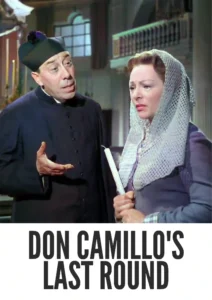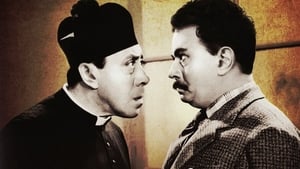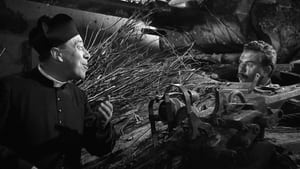Contact: info@alwanfilm.com
Video Sources 0 Views
- Watch trailer
- Don Camillo's Last Round 1955 Colorized
Synopsis
Table of Contents
ToggleReview: Don Camillo’s Last Round 1955 Colorized – A Timeless Classic Revisited

Introduction
“Don Camillo’s Last Round” (1955), directed by Julien Duvivier, is a quintessential entry in the beloved Italian comedy series that began with “Don Camillo” (1952). This film represents the final chapter in the cinematic adventures of the eponymous priest, portrayed by the indelible Fernandel. Set in the quaint, fictional Italian village of Brescello, the film continues to explore the endearing conflicts between the progressive communist mayor, Peppone (played by Gino Cervi), and the traditionalist priest, Don Camillo. The film’s charm lies in its humorous yet poignant portrayal of social and political tensions through the lens of an enduring friendship. In this article, we will delve into the significance of “Don Camillo’s Last Round,” examining its characters, themes, and impact on the genre, as well as discussing its place within the broader context of film history.
Check The Full Colorized Movies List
Check Our Colorized Movies Trailer Channel
Understanding Don Camillo’s Last Round 1955 Colorized: Director, Cast, and Genre
“Don Camillo’s Last Round” (1955) is a delightful Italian comedy directed by Julien Duvivier, a filmmaker renowned for his versatile storytelling across various genres. This film marks the third installment in the series based on the popular stories by Giovanni Guareschi. The series is celebrated for its blend of comedy and drama, offering a unique perspective on post-war Italian society.
Director Julien Duvivier: Duvivier, a master of both French and Italian cinema, brings his seasoned expertise to this film, blending humor with heartfelt moments. His direction ensures that the film remains true to the spirit of Guareschi’s original stories while adding his own cinematic flair.
Cast: The film stars the inimitable Fernandel as Don Camillo and Gino Cervi as Peppone. Fernandel’s portrayal of Don Camillo, with his expressive face and comedic timing, captures the essence of the character’s complex personality. Gino Cervi’s performance as Peppone complements Fernandel’s with a perfect balance of warmth and bluster.
Genre: The film is a comedy-drama that skillfully weaves humor with serious themes. It navigates the social and political landscape of post-war Italy through the comedic interactions between the priest and the mayor, while also addressing deeper issues such as friendship, faith, and social change.
Exploring the World of Don Camillo’s Last Round 1955 Colorized: Plot and Characters
“Don Camillo’s Last Round” continues the story of Don Camillo and Peppone as they navigate a changing Italy. The film begins with the village in the midst of a transition as political and social shifts threaten to upend the status quo. As always, the dynamic between Don Camillo and Peppone remains central to the narrative.
Plot Summary: The film opens with the village facing a new set of challenges. Peppone, the communist mayor, is determined to modernize the village according to his political ideals, while Don Camillo remains steadfast in his traditional values. The comedic clashes between the two are both entertaining and thought-provoking, highlighting the friction between old and new values.
A key subplot involves a controversial project that Peppone proposes, which Don Camillo believes will undermine the village’s cultural heritage. Their opposing views lead to a series of humorous confrontations, but ultimately, their mutual respect and underlying friendship shine through.
Key Characters:
- Don Camillo (Fernandel): The priest with a fiery temperament and a heart of gold. His interactions with Peppone are a mix of comic duels and heartfelt moments. Don Camillo’s strong moral convictions and dedication to his parish make him a beloved figure in the village.
- Peppone (Gino Cervi): The mayor and Don Camillo’s political rival. Though he is a staunch communist, Peppone is portrayed with a certain level of warmth and humanity. His ideological battles with Don Camillo are central to the film’s humor and charm.
- Other Characters: The film also features a supporting cast of villagers who contribute to the comedic and dramatic elements of the story. Their interactions with Don Camillo and Peppone add depth and variety to the narrative.
The Art of Cinematic Comedy and Drama
“Don Camillo’s Last Round” exemplifies the art of blending comedy with drama. The film’s humor is derived from the characters’ interactions and the situations they find themselves in, while its dramatic moments are grounded in the genuine relationships between the characters.
Comedy and Satire: The film uses satire to comment on the political and social issues of its time. The comedic elements, such as Don Camillo’s physical antics and Peppone’s blustering speeches, are carefully crafted to entertain while also provoking thought about the nature of change and tradition.
Dramatic Depth: Beneath the surface of the comedy lies a poignant exploration of friendship, loyalty, and the struggle to adapt to a changing world. The film’s dramatic moments, such as the heartfelt exchanges between Don Camillo and Peppone, add emotional weight to the story.
Early Italian Comedy: A Brief History
Italian comedy, particularly during the mid-20th century, was characterized by its blend of humor and social commentary. The “Don Camillo” series is part of this tradition, reflecting the cultural and political landscape of post-war Italy.
Origins of Italian Comedy: Italian cinema has a rich tradition of comedy, from the early days of silent films to the more sophisticated comedies of the 1950s and 1960s. The “Don Camillo” series, with its roots in Giovanni Guareschi’s stories, fits into this tradition by combining humor with insightful social observations.
Impact on Cinema: The success of films like “Don Camillo’s Last Round” contributed to the popularity of Italian comedy both domestically and internationally. The film’s ability to address serious themes through humor helped establish a unique genre that resonated with audiences worldwide.
Don Camillo’s Last Round 1955 Colorized and Its Place in Film History
“Don Camillo’s Last Round” holds a special place in film history as a quintessential example of Italian comedy. The film’s blend of humor, drama, and social commentary makes it a lasting favorite among audiences and critics alike.
Significance of the Film: The film represents the culmination of the “Don Camillo” series, bringing closure to the beloved characters and their storylines. It also reflects the broader cultural and political changes occurring in Italy during the 1950s.
Legacy: The enduring popularity of “Don Camillo’s Last Round” underscores its impact on Italian cinema. The film’s ability to entertain while addressing serious issues has made it a classic that continues to be appreciated by new generations of viewers.
The Influence of Julien Duvivier
Julien Duvivier’s work on “Don Camillo’s Last Round” showcases his versatility as a director. Known for his contributions to both French and Italian cinema, Duvivier’s direction brings a unique blend of humor and depth to the film.
Duvivier’s Style: Duvivier’s direction is characterized by a keen eye for detail and a talent for blending genres. In “Don Camillo’s Last Round,” he effectively balances comedy with dramatic moments, creating a film that resonates on multiple levels.
Impact on Filmmaking: Duvivier’s approach to filmmaking has influenced subsequent directors, particularly in the realm of comedy and drama. His ability to craft engaging stories that explore complex themes continues to inspire filmmakers around the world.
Themes Explored in Don Camillo’s Last Round 1955 Colorized
“Don Camillo’s Last Round” delves into several themes, including tradition versus progress, friendship, and the impact of social change. These themes are explored through the interactions between Don Camillo and Peppone, as well as the broader context of the village.
Tradition versus Progress: The film highlights the tension between traditional values and modern ideals. Don Camillo represents the old ways, while Peppone embodies the new. Their interactions reflect the broader societal shifts occurring in post-war Italy.
Friendship: Despite their ideological differences, Don Camillo and Peppone share a deep mutual respect and friendship. Their relationship serves as a poignant reminder of the importance of understanding and cooperation, even in the face of disagreement.
Social Change: The film also addresses the impact of social and political change on individuals and communities. Through the comedic and dramatic elements, it explores how people navigate the challenges of a changing world.
Reception and Controversy Surrounding Don Camillo’s Last Round 1955 Colorized
“Don Camillo’s Last Round” received positive reviews for its humor, performances, and thematic depth. However, as with any film that addresses political and social issues, it also faced some controversy.
Critical Reception: The film was praised for its engaging storytelling and the strong performances of Fernandel and Gino Cervi. Critics appreciated the film’s ability to balance comedy with serious themes, making it a memorable entry in the “Don Camillo” series.
Controversy: Some viewers and critics took issue with the film’s portrayal of political and social issues, particularly in the context of its comedic approach. However, these debates highlight the film’s relevance and its role in reflecting the complexities of its time.
Where to Watch Don Camillo’s Last Round 1955 Colorized Online
For those interested in experiencing “Don Camillo’s Last Round,” the film is available on various streaming platforms and through physical media releases. Its availability ensures that new generations of viewers can enjoy this classic Italian comedy.
Streaming Options: The film can be found on several popular streaming platforms, making it accessible to a wide audience. Whether through digital rentals or subscriptions, viewers have multiple options for watching this beloved classic.
Physical Media: For collectors and enthusiasts, “Don Camillo’s Last Round” is available on DVD and Blu-ray, often including additional features and commentary that provide further insight into the film’s creation and legacy.
FAQs About Don Camillo’s Last Round 1955 Colorized
Q: What are the key themes of “Don Camillo’s Last Round”?
A: The film explores themes of tradition versus progress, friendship, and the impact of social change. It uses the comedic interactions between Don Camillo and Peppone to address these themes in a thoughtful and engaging manner.
Q: How does “Don Camillo’s Last Round” compare to other films in the series?
A: As the final installment in the “Don Camillo” series, “Don Camillo’s Last Round” provides closure to the characters’ storylines while maintaining the series’ trademark blend of humor and social commentary. It builds on the themes and characters established in the earlier films, offering a satisfying conclusion.
Q: Is the film historically accurate?
A: While “Don Camillo’s Last Round” reflects the social and political climate of post-war Italy, it does so through a fictional and comedic lens. The film is not intended to be a historical document but rather a commentary on the era’s issues through its engaging narrative.
Conclusion
“Don Camillo’s Last Round” (1955) remains a cherished classic in Italian cinema, celebrated for its blend of humor, drama, and social commentary. Directed by Julien Duvivier and featuring the unforgettable performances of Fernandel and Gino Cervi, the film offers a heartwarming and thought-provoking exploration of tradition, progress, and friendship.
As a fitting conclusion to the “Don Camillo” series, the film encapsulates the essence of the characters and their journey, while also reflecting the broader cultural and political shifts of its time. Whether watched for its comedic charm or its deeper themes, “Don Camillo’s Last Round” continues to resonate with audiences, ensuring its place as a timeless classic in the annals of cinema.














